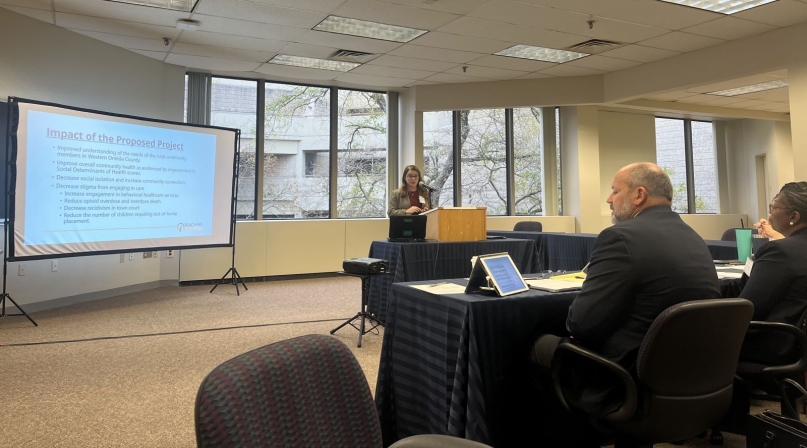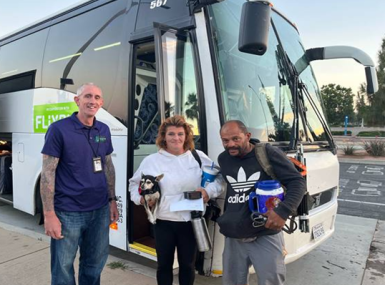Provider sidesteps rural mistrust in government, delivers services
Author
Upcoming Events
Related News

Key Takeaways
Oneida County, N.Y. is helping its rural residents by partnering with an organization to help bring services to Camden, located about an hour from the county seat of Utica.
The organization, called Camden Life Center, is helping bring county services to residents grappling with limited access to essential services, with no transit and sporadic connectivity.
“When our [government] came out here, it was because Child Protective Services was involved, or probation or parole are involved, so there was this really negative relationship between community members and [government] services,” said social worker Jessica Perusse, who is also the founder and director of Camden Life Center.
“The only thing they do is take away my kids are tell me what to do,’” summed up the local attitude toward government, she noted.
So when the county looked to offer more resources and attention to Camden, Perusse’s organization offered service delivery from a local provider that already had credibility with local residents.
Oneida County has been able to leverage the Camden Life Center as a trusting western Oneida hub where residents experience a “warm hand off” to county services.
Perusse was a fellow in NACo’s Reaching Rural Initiative, a yearlong initiative bringing together rural practitioners to advance solutions to address the challenges of substance use in their communities. Last month, she shared her successes with her peers.
Those successes included bringing together local council advisory members and partner agencies, including Oneida County and Syracuse University, to conduct a SWOT (strengths, weaknesses, opportunities and threats) analysis. Oneida County agencies, such as Oneida County Department of Mental Health, joined in this process, acknowledging the gap of services available to western Oneida residents.
Together, they aim to increase local access to services, address stigma and offer prevention efforts by funneling essential county-managed resources, such as temporary assistance programs such as SNAP (supplement nutrition assistance program), Medicaid, Emergency Aid and Home Energy Assistance Program, through the Camden Life Center.
Recognizing its geographical limitations and Camden residents’ mistrust in government services, Oneida County models how community-based partners like the Camden Life Center can serve as a valuable tool for facilitating services and building trust.
Over the past two years, Perusse established an advisory board, consisting of community members with lived experiences or close ties to those struggling with addiction, which has been instrumental in building trust in their services.
“Before 2019, there were zero behavioral health appointments in our community, and right now, we’re estimating about 350 appointments per month mental health and addiction treatment appointments occur,” she said.
The Camden Life Center also prioritizes street outreach and participating in various events to establish themselves as a regular presence in the community. Thus, Camden Life Center was a natural partner for the Camden Street Engagement Team as part of Oneida County’s Opioid Task Force, coordinating outreach and intervention strategies to help reduce overdoses.
There are plans afoot to expand the Camden Life Center, Perusse said. She envisions a multi-use community café to host recovery network meetings, serve as a retail coffee shop and feature a teaching kitchen. She aims to expand programs specializing in social services, peer support, case management, mental health and addiction treatment, nutrition, vocational and financial resources.
Plans for the new community café call for a lead chef to maintain health standards and partner on teaching and staff education and a lead recovery peer to facilitate recovery network meetings, outreach and provide a supportive environment.
The goal is to provide job skills for individuals entering or reentering the workforce with substance use disorder. A recent promising addition to the Camden Life Center team is an intensive case manager piloting a program in five town courts within the jurisdiction, offering education, information, intact assessments, and direct connections to treatment services.
“In 2024, our goal is to move a little bit further and push a little bit further to engage in county services and bringing them out here,” Perusse said. “They have been very good at connecting us with other agency partners that might be of assistance in our community.”
Related News

Insights from county leaders on the future of early childhood care and education
NACo's Prenatal-to-Three breakfast and listening session gathered county leaders to identify barriers, explore solutions and support local leaders advancing their priorities.

Team approach, website help California county tackle homelessness
Riverside County, Calif. created a multidisciplinary team to better and more efficiently serve its unsheltered population and share success stories and data through a website.

Ohio county boosts community youth programs with ARPA funding
Hamilton County, Ohio invested ARPA dollars in community organizations through the INSPIRE Youth initiative.
Webinar
Reaching Rural: Advancing Collaborative Solutions
NACo and partners at Bureau of Justice Assistance, CDC and State Justice Institute are excited to announce the new initiative, Reaching Rural: Advancing Collaborative Solutions. The initiative empowers rural practitioners to build networks, adopt solutions and reimagine how diverse systems can engage to serve justice-involved individuals with substance use or co-occurring disorders. Applications are due September 30.
This is an external webinar hosted by the Bureau of Justice Assistance.

